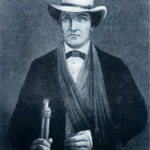ASAFO, AGYEI
- 4 Min Read
Asafo Agyei (Asafu-Adjaye) (18? -1885) was a ruler of Dwaben, one of the founding states of the Asante Union, located to the northeast of the Asante capital of Kumase. Ruling from about 1845-80, he reconstituted Dwaben’s fortunes after its population had returned from exile, and later led his people in their migration to the Koforidua area, about 40 mi (64 km) inland from Accra, after their defeat by the Asante in 1875.
Asafo Agyei’s mother was a woman from Kwawu, a state to the east of Asante, who belonged to the Asona clan (one of the seven clans of the Akan). This meant that he was not born into the royal line eligible to succeed to the Dwaben stool. But his father, Boaten Panin (Kwasi Boaten), or Boaten the Elder, of the Oyoko clan, was the Dwabenhene (ruler of Dwaben) from about 1800 to about 1837. Asafo Agyei was thus a prince of the Dwaben stool, and before he became Dwabenhene himself, was the kurontihene (war leader) of the state. A series of historical accidents led to his elevation to the stool. In 1832 a civil war broke out between Dwaben and Asante. Dwaben was defeated, after which its people migrated en masse to Kyebi, capital of the state of Akyem Abuakwa to the southeast. Asafo Agyei was, however, captured during the war, and sent to Kumase.
So long as Osei Yaw [ruled 1824-38] was Asantehene, the people of Dwaben remained at Kyebi, refusing to return to Dwaben. But when he was succeeded by Kwaku Dua I [ruled 1838-67], they consented to return home. On the way home, however, first Asafo Agyei’s father, Boaten Panin, and then his brother, Boaten Kuma (Kofi Boaten), or Boaten the Younger, who succeeded to the stool, died. It was left to his grandmother, the Queen Mother Nana Seewa (Ama Sewa, or Oseiwa), who in the absence of a male heir combined the offices of ruler and queen, to lead the people of Dwaben back to their original homeland, where they arrived in 1841. As, however, she was rather old and sickly, as the Rev. T. B. Freeman, the Wesleyan missionary, testified after visiting her in 1842, she accepted the appeals made to her by the Asantehene as well as by some of the Dwaben elders, to yield the male stool to Asafo Agyei, her grandson. Asafo Agyei was then sworn in as Dwabenhene in about 1845.
He soon proved to be an able and gifted leader, and under his enlightened rule, Dwaben revived its lost fortunes. The Revs. Friederich A. Ramseyer and J. Kühne, Basel missionaries captured by the Asante in 1869 and sent to Kumase, passed through Dwaben on their way, and were both impressed by the town and its buildings. In view of the fact that Freeman, who had visited it in 1842, had reported it to be “in ruins for several years,” their report indicates the remarkable progress made. Such progress, however, was dependent upon the continuance of the good relations that Asafo Agyei had established with the Asantehene. Unfortunately these relations deteriorated, and in 1875 war again broke out between Dwaben and Kumase. The conflict arose primarily because the people of Dwaben had not taken part in the Sagrenti war between the Asante and the British in 1873-74.
The abstention of the ruler and the people of Dwaben was due primarily to the non-aggression pact with the people of Dwaben had concluded with Akyem Abuakwa during their stay in Akyem during the 1830s, but also to British diplomacy. The Asantehene interpreted the conduct of Asafo Agyei and his people as a betrayal of the Asante nation, however, and therefore sent troops against Dwaben. The resulting war led to the defeat of Asafo Agyei, and the second mass migration of the Dwaben people to the British Colony of the Gold Coast, in the southern part of what is now Ghana. After staying for some time in Accra, the Dwaben people were resettled on land bought for them by the British administration, and upon it they founded the modern city-state of Koforidua, called for a time New Dwaben.
While in Accra, however, the British discovered that Asafo Agyei was intriguing with King Taki (Tackie, or Tachie) Tawia I (ruled 1862-1902) of Accra to invade Asante. The British governor, anxious to avoid another war with Asante, exiled Asafo Agyei to Lagos, in what was to become Nigeria, in 1880, and he died there in 1885.
A.A. BOAHEN



